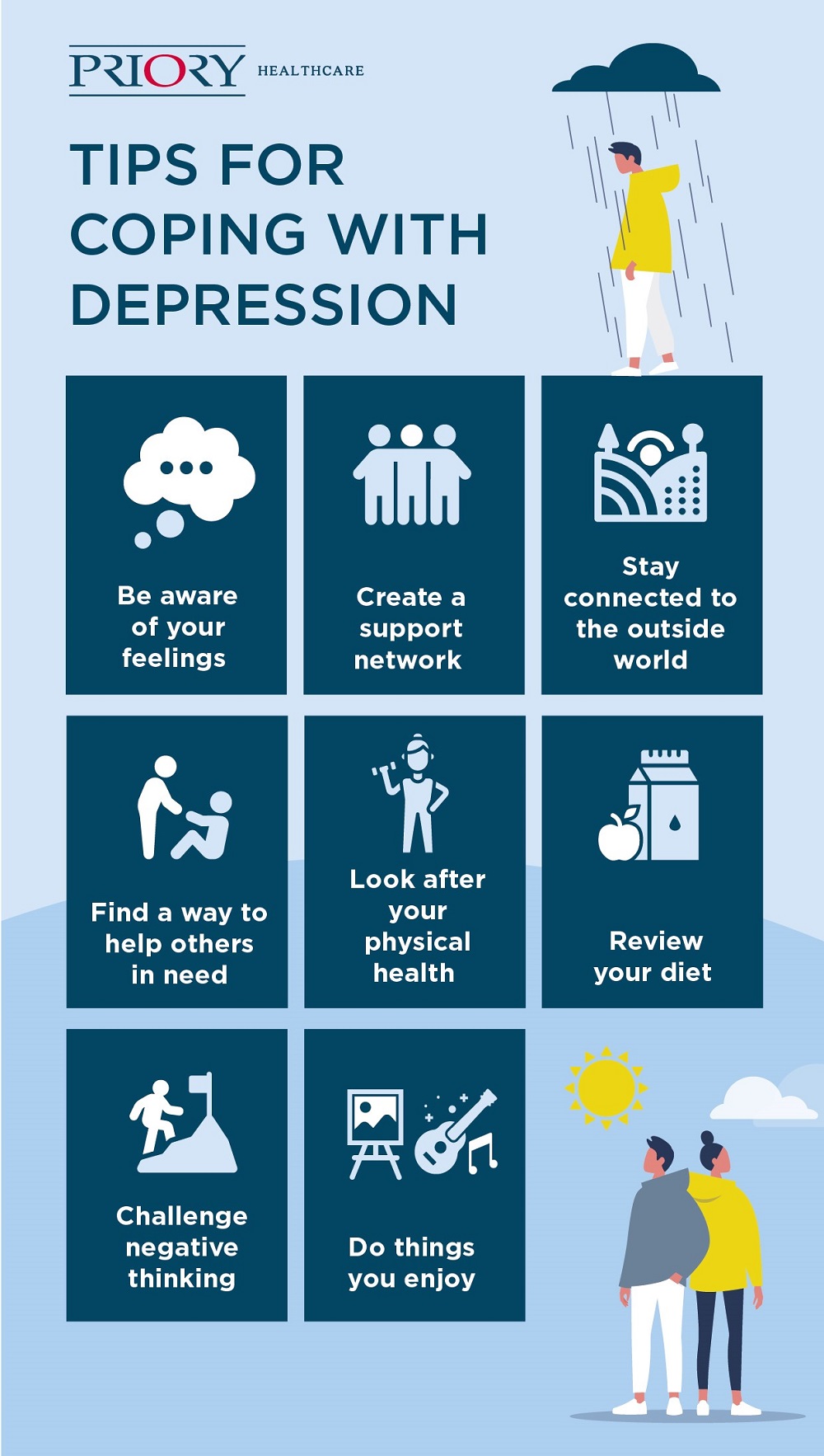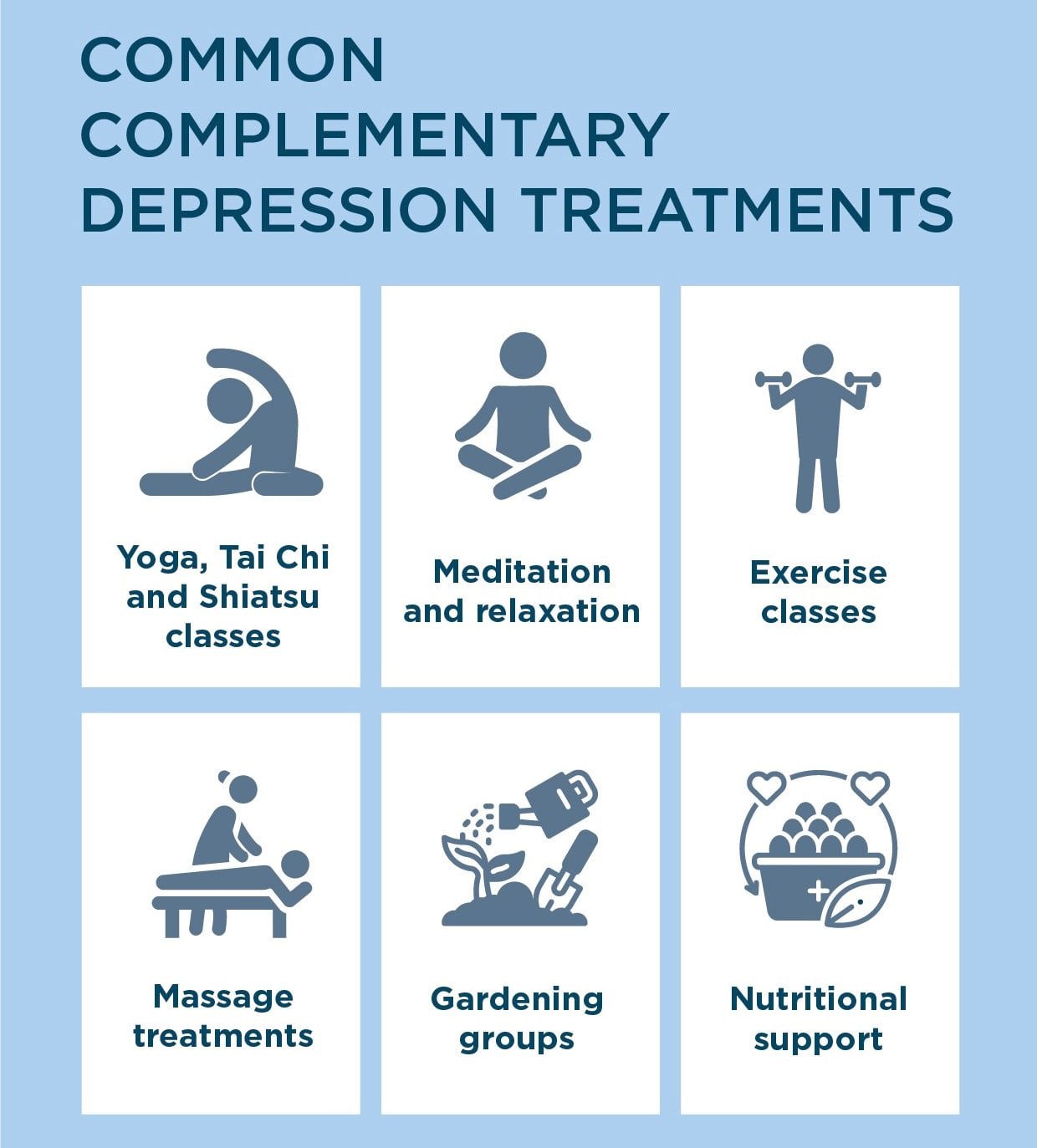How to cope with depression
Learning effective self-help strategies for depression can empower you to manage your symptoms and improve your wellbeing.
Learning effective self-help strategies for depression can empower you to manage your symptoms and improve your wellbeing.



For many people, dealing with depression is a daily reality. Affecting all aspects of your professional, social and personal life, depression can have a debilitating impact on how you function on a day-to-day basis.
Thankfully, there are some proven things you can do to overcome the symptoms of depression and continue to live a healthy, productive life. With that in mind, we have outlined some of the most effective self-help tips, strategies and mechanisms for coping with depression.
Feeling depressed is an uncomfortable feeling, and we tend to push negative emotions away. We understand how difficult these feelings are to cope with, but understanding your emotions can be a big help when coping with depression.
Take the time to recognise and think about your feelings, as they might help you to understand the source of what is making you feel depressed. Depression is often linked to events in the past, and sometimes there can be no explanation at all. Either way, becoming aware of these things is part of coping with depression.
Once you have a better understanding of why you feel depressed, you can take steps towards rectifying the issue and improving your overall wellbeing.
When you feel depressed, you may have a tendency to hide away and bottle up your feelings. However, the best approach is to build a support network of friends, relatives or even dedicated support groups, who can help you address how you're feeling.
We recognise that talking to someone about your depression can be difficult for you. Whoever it is, it’s better if it's someone who's able to listen and empathise with you about how you’re feeling. Dedicated support groups for depression can be a great way to find like-minded people to share your experiences with, either in person or remotely. Look online to find what depression support groups are out there for you.
Socially, you might also be tempted to shut yourself away, saying “no” when friends or family ask if you want to meet up with them. This reaction is completely normal, but being present at social events, and spending time with other people, can help to reduce your symptoms of depression and help keep them at bay in the future.
Social media and video calls are a convenient way to do this, but if you’re able to then a face-to-face meeting will have the most positive effect. You could try taking small steps with the goal of a meeting in a public location being the end goal. Whatever you try, make sure you only commit to what feels comfortable for you.
Exercise has long been known to be a great way to fight depression. If you feel well enough, head out and get some fresh air outside. Even if it’s just a brief stroll in the park, being outdoors can benefit your mental health, but again, you should only do what feels right. If you need to build up to this by starting off slowly (perhaps with a walk around your garden first), then do what’s right for your recovery.

Another significant factor in managing depression is good quality sleep. Research shows that 80% of people with clinical depression struggle with disturbed sleep. Small things like turning off electronic devices and ditching late-night caffeinated drinks and stodgy foods may help you to get a better night’s sleep. With better sleep, you might also find your mood improving in the day.
The evidence shows that exercise can be a way to manage symptoms of depression, thanks to the endorphins, dopamine and serotonin that are released during exercise, that make us feel better. If you feel well enough to do so, introduce exercise into your daily routine.
If your response to your depression has been to overeat or comfort eat, try not to overdo it. Alcohol and recreational drugs are often used to cope with negative emotions, including feeling depressed. You’re not alone in having this response to the emotions you’re feeling, but excessive alcohol or drugs can make depression worse. You could try and introduce some of these simple tips to cutting down on alcohol.
Elsewhere, be sure to speak to your GP; they'll be able to tell you what nutrients and vitamins you’re in need of.
Feelings of pessimism and hopelessness are common symptoms of depression. Defined as ‘cognitive distortions’, these are thoughts that are irrational or unrealistic – but you can overcome them if you challenge them in the right way.
If you find yourself thinking in these terms, ask yourself some challenging questions like:
Examining your thought processes is a great way to develop more balance in how you think about situations unfolding around you.
Written and narrated by Priory Therapist, Adele Burdon-Bailey, take 10 minutes from your day to ease symptoms of depression with this guided meditation.
In the long-term, you’re going to need a whole toolbox of things you can rely on to calm yourself down. Ultimately, you just need to do things you know you enjoy so that you can get motivated when you feel low. Some of these things, like playing sports or seeing friends, have already been mentioned. Here are just a few more ideas that will give you a wealth of options next time you need to deal with depression:
Receiving support is one of the most valuable ways to deal with depression, and getting your own mental health right should obviously be a priority. However, evidence shows that supporting others might be another great way to boost your mood. The Journal of Happiness Studies found that those who volunteer receive a boost to their mental health and greater satisfaction in their lives.
Think about ways you can give back to your local community, either through charity work or helping someone else out who you know is in need. It might bring you as many benefits as those you're helping.
For those who have experienced depression symptoms for a significant amount of time, it might be right for you to seek effective medical treatment for the condition. Even when in treatment for depression, self-help can make you feel better can play a big role in reducing your symptoms.

Helping you to stay healthy in mind, body and spirit can play a huge role in your recovery from depression. That’s why we also offer a range of wellbeing activities and complementary treatments for depression. These may include:
We'll also help you to learn positive lifestyle changes that you can use long after treatment, to help keep depression at bay.
These can include things like sleep hygiene methods (techniques you can use to help you get a good night’s sleep), breathing and grounding techniques, physical exercise for mental health, and various coping mechanisms.
We’ll also teach you about the importance of a healthy diet as a way of boosting your mental health and reducing the chances of you becoming depressed again.
